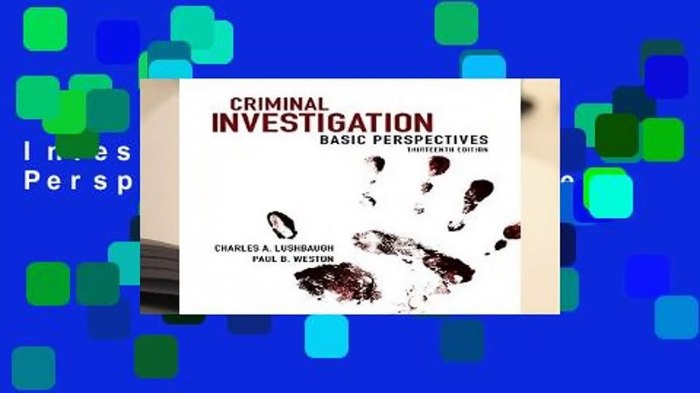Criminal investigation basic perspectives 13th edition – Criminal Investigation Basic Perspectives, 13th Edition, delves into the multifaceted world of criminal investigation, providing a comprehensive and authoritative exploration of the field. This seminal work offers a profound understanding of the principles, practices, and emerging trends that shape modern criminal investigations.
Through a captivating narrative, the text unravels the intricacies of crime scene investigation, interviewing and interrogation techniques, investigative report writing, and real-life case studies. It illuminates the crucial role of criminal investigation in the criminal justice system and examines the ethical considerations that guide investigators in their pursuit of justice.
Introduction to Criminal Investigation
Criminal investigation is a complex and challenging field that plays a vital role in the criminal justice system. Criminal investigators are responsible for gathering and analyzing evidence, interviewing witnesses and suspects, and developing theories about how crimes were committed. The goal of a criminal investigation is to determine the truth about a crime and to bring the perpetrators to justice.
There are many different types of criminal investigations, including homicide investigations, robbery investigations, and drug investigations. Each type of investigation requires its own unique set of skills and knowledge. However, all criminal investigations share some common elements, such as the need to preserve and document the crime scene, interview witnesses and suspects, and develop a theory about how the crime was committed.
Crime Scene Investigation

The crime scene is the most important piece of evidence in a criminal investigation. It is where the crime occurred, and it contains a wealth of information about the crime and the perpetrator. Crime scene investigators are responsible for preserving and documenting the crime scene, and for collecting any evidence that may be present.
The first step in a crime scene investigation is to secure the scene. This means preventing anyone from entering or leaving the scene, and preserving any evidence that may be present. Once the scene is secure, crime scene investigators will begin to document the scene.
This includes taking photographs, making sketches, and writing notes about everything they observe.
Once the scene has been documented, crime scene investigators will begin to collect evidence. Evidence can include anything that can help to prove or disprove a crime, such as fingerprints, DNA, weapons, and clothing. Crime scene investigators will also interview any witnesses who may have seen the crime or who may have information about the perpetrator.
Interviewing and Interrogation
Interviewing and interrogation are two essential tools for criminal investigators. Interviews are used to gather information from witnesses and suspects, while interrogations are used to obtain confessions from suspects.
There are many different types of interviews, but all interviews share some common elements. First, the interviewer will establish rapport with the interviewee. This means building a relationship of trust and rapport so that the interviewee is more likely to cooperate.
Once rapport has been established, the interviewer will begin to ask questions about the crime. The interviewer will ask open-ended questions that allow the interviewee to provide as much information as possible.
Interrogations are more confrontational than interviews. The interrogator will use a variety of techniques to try to get the suspect to confess. These techniques can include lying to the suspect, making threats, and offering rewards. Interrogations can be very stressful for suspects, and it is important for interrogators to use ethical methods.
Investigative Report Writing: Criminal Investigation Basic Perspectives 13th Edition
Investigative report writing is an essential part of criminal investigation. Investigative reports are used to document the findings of an investigation and to provide recommendations for further action. Investigative reports can be used to prosecute criminals, to exonerate innocent people, and to improve law enforcement practices.
There are many different types of investigative reports, but all investigative reports share some common elements. First, the report will include a summary of the investigation. This summary will include the facts of the case, the evidence that was collected, and the conclusions of the investigation.
The report will also include a discussion of the investigation. This discussion will include the methods that were used to conduct the investigation, the challenges that were encountered, and the lessons that were learned.
Criminal Investigation Case Studies

Criminal investigation case studies are a valuable tool for learning about criminal investigation. Case studies provide real-world examples of how criminal investigations are conducted and how crimes are solved. Case studies can also be used to teach students about the challenges and rewards of criminal investigation.
There are many different types of criminal investigation case studies. Some case studies focus on specific crimes, such as homicides or robberies. Other case studies focus on specific investigative techniques, such as interviewing or interrogation. Case studies can also be used to teach students about the history of criminal investigation.
Emerging Trends in Criminal Investigation
The field of criminal investigation is constantly evolving. New technologies and new investigative techniques are being developed all the time. These new technologies and techniques are changing the way that criminal investigations are conducted and how crimes are solved.
One of the most significant trends in criminal investigation is the use of technology. Technology can be used to collect and analyze evidence, to interview witnesses and suspects, and to develop theories about how crimes were committed. Technology can also be used to track criminals and to prevent crimes from happening in the first place.
Question & Answer Hub
What are the key principles of criminal investigation?
The key principles of criminal investigation include objectivity, thoroughness, impartiality, and the preservation of evidence.
What are the different types of crime scenes?
Crime scenes can be classified into various types, including indoor, outdoor, vehicle-related, and digital.
What is the importance of interviewing and interrogation in criminal investigations?
Interviewing and interrogation are crucial for gathering information, developing leads, and obtaining confessions from suspects.
What are the ethical considerations involved in criminal investigations?
Ethical considerations in criminal investigations include respecting the rights of suspects, ensuring the integrity of evidence, and maintaining confidentiality.
What are the emerging trends in criminal investigation?
Emerging trends in criminal investigation include the use of advanced technology, data analysis, and digital forensics.